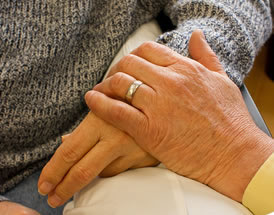Breaking Bad News

Three Perspectives on giving and receiving news that a loved one has cancer
1. Patient
Karen Pitton
an endometrial cancer survivor
On hearing the news from her gynecologist:
She told me they looked at the results and saw cells that were consistent with endometrial cancer. She didn’t come right out and say it. It wasn't until
later in the conversation that I said to her, "So what you're telling me is that I have endometrial cancer?" She said yes.
On telling her family:
I called my mother the next morning and it was the hardest phone call I have ever had to make. I found myself saying the exact same thing the doctor said to me. I used the same phrases and terminology. I wondered if my mother actually knew I had cancer or if she thought it was all precautionary. She knew.
In an ideal world:
I liked that my doctor spent a lot of time on the phone with me. She called at night and I suspect she wanted to ensure she had enough time to spend on the phone. I asked questions. It was a discussion. Instead of her saying the cells were consistent with cancer, I wanted to hear it straight out.
2. Family Member
Diane Drago, whose husband, Bud, passed away from kidney cancer complicated by Parkinson's Syndrome
On receiving difficult news:
I asked the oncologist if this was the beginning of the end. He replied, "No, you're really in the middle of the end and you need to prepare." Not everyone wants to
hear it, but I did.
We had a final meeting with the oncologist, neurologist, rehab team and social worker. Everyone knew why we were there, but the elephant in the room remained. It was clear my husband was waiting for someone to say it. Finally, his oncologist paused and quietly said, "Bud, we just don't have the tools to fix what's wrong with you. I’m sorry." My husband visibly relaxed. He had permission to stop fighting and was finally at peace.
Upon reflection:
The oncologist and Bud established a great bond quickly. Their communication was straightforward and thorough from the start -- exactly what he needed. Even the processes of chemo preparation and resulting wait time were explained at the outset. When I hear other people's stories, I'm often saddened. Not everyone is fortunate to have the kind of care team we did.
3. Physician
Alon Weizer, M.D., a urologist at the U-M Rogel Cancer Center
On delivering the news:
Delivery of the news of a cancer diagnosis is never easy. It is also not a skill set that is taught in medical school. I believe it is critical to get to know the patient both from a medical and personal standpoint. I assess a patient's understanding of the current circumstance. It is important I do my homework before having the conversation so I can tell them about the disease and what options are available to them.
What you‘ve learned:
When I let emotion rise to the top of the discussion, I failed to give my patient the information needed to make a good decision.
I like to discuss the treatment options available based on the facts. Broad discussions around treatment options are not helpful because we could be having discussions about treatment choices that are not appropriate based on the stage and grade of the cancer.
Speculation should never be part of the conversation.
The best scenario:
I must be prepared to discuss the specifics of the cancer, the need for additional diagnostic tests, the treatment and who will be responsible for the aspects of treatment.
It is very helpful when patients come with a list of questions and a person who can be a second set of ears that they trust.
Read the Fall, 2014 Thrive
